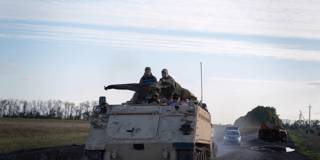OnPoint Subscriber Exclusive
The Big Picture brings together a range of PS commentaries to give readers a comprehensive understanding of topics in the news – and the deeper issues driving the news. The Big Question features concise contributor analysis and predictions on timely topics.

Russia on the Run
Recent developments in Ukraine – including an attack on the symbolically important and strategically vital Kerch Strait Bridge linking Russia to Crimea, and, more importantly, Ukrainian forces’ liberation of huge swaths of territory that Russia had just “annexed”– have set the Kremlin on edge. But Russian President Vladimir Putin still possesses a massive nuclear arsenal and plenty of cannon fodder – and may be unafraid to use them.
Then again, maybe not both of them. While Putin has shown no compunction about sending Russians to their deaths, Josef Joffe of the Johns Hopkins School of Advanced International Studies argues that he is unlikely to deploy a nuclear weapon, even a “little” tactical one. Putin may “simulate insanity,” but it is “‘rational’ brinkmanship,” aimed at “intimidating Ukraine and the West” in a way Russia’s “failing army” cannot.
Putin’s “nuclear bluster” is also supposed to help him at home, says the New School’s Nina L. Khrushcheva, by “papering over” the fact that the war in Ukraine is a “strategic disaster” for Russia and that the international community will never recognize Putin’s latest territorial claims. But what is really protecting Putin from internal challenges to his rule is not the Kremlin’s narrative about Ukraine, which “not all Russians are buying,” but rather naked repression.
For Ukraine, Russia’s tyranny is straightforward, and as Anders Åslund, a senior fellow at the Stockholm Free World Forum, notes, fighting it will require more from the West than a “steady supply of arms.” Ukraine also needs drastically increased financial support, so that it can afford to keep its government functioning without relying on inflationary debt monetization.
At the same time, warns Slavoj Žižek of the University of London, the West must not “play into Putin’s hands” by bypassing Ukraine and brokering a settlement with Russia – a strategy that would support the Kremlin narrative that Ukraine is a colony, rather than a sovereign country. Nor is economic appeasement an option, says MIT’s Simon Johnson. Instead, Europe’s response should be “to adopt properly and implement fully the proposed G7 price cap on oil – and to extend the same principle to coal.”